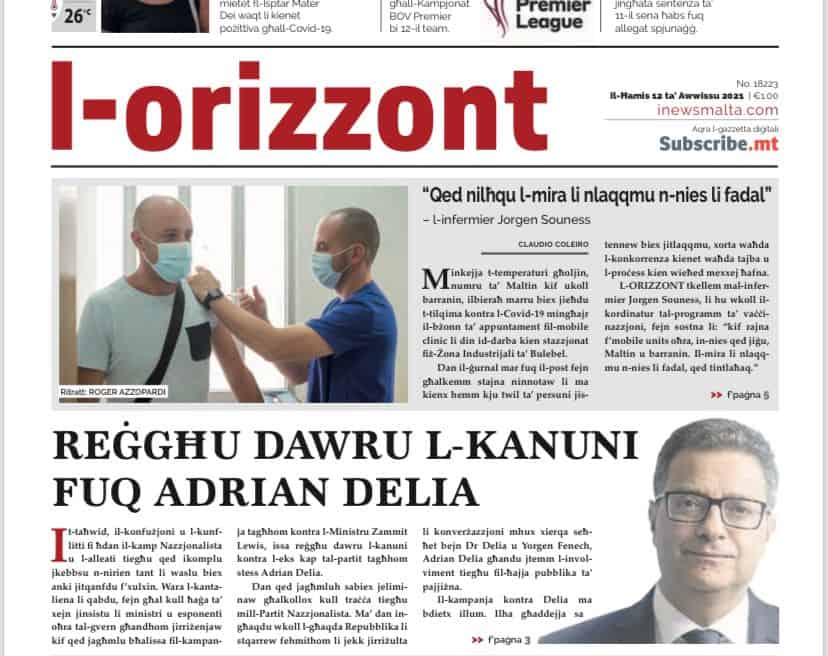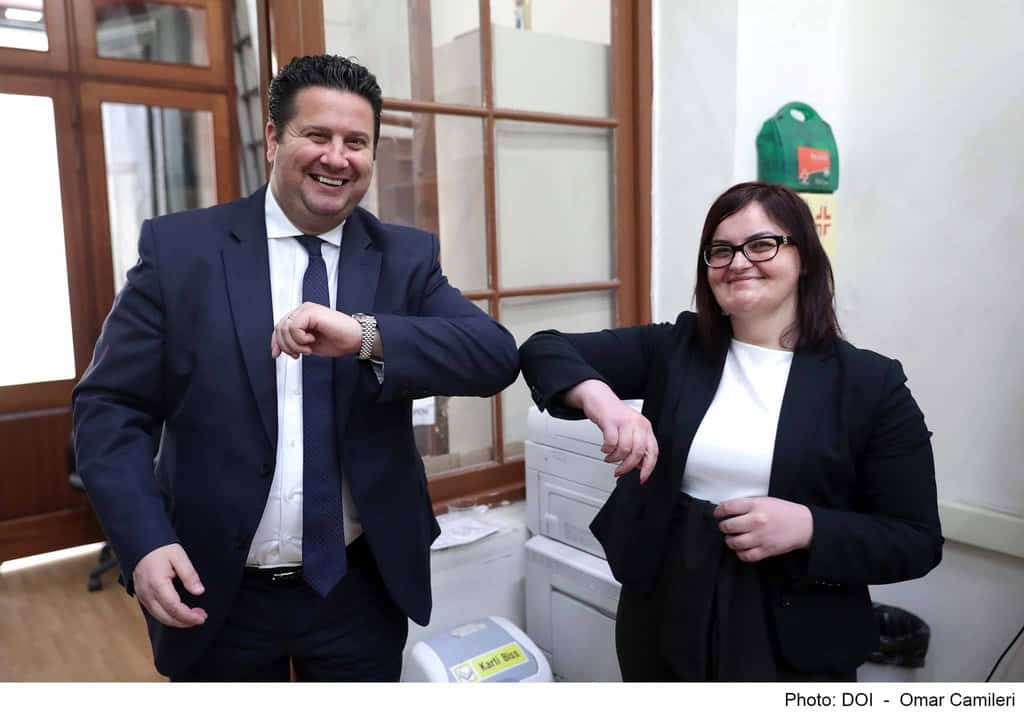L-orizzont today rushed in defence of the only person they like in the Nationalist Party, Adrian Delia. They mocked Repubblika’s remark that should allegations that Adrian Delia conspired with Yorgen Fenech while Parliament was debating his ownership of 17 Black he should withdraw from politics for good.

L-orizzont said this was part of Repubblika’s silly habit of calling for people’s resignations “for no reason whatsoever” such as the ongoing call for Edward Zammit Lewis to resign. “Għal kull ħaġa ta’ xejn”.
Let me discuss an example of no reason whatsoever: Victoria Buttigieg, attorney general and therefore chief prosecutor.
The Daphne Caruana Galizia inquiry criticised the advice she gave Ministers that the security of supply agreement between the government and Electrogas could be signed by Konrad Mizzi without the need of any further approvals – from his cabinet colleagues or from Parliament.
The three judges on the inquiry board sounded like they would have given different advice. But this is not just a matter of opinions, or about who happened to be in the job and that people change so opinions change. The board of inquiry clearly suggest that in giving the advice she gave Victoria Buttigieg (then Deputy Attorney General when the role was not just about criminal prosecutions but also as state’s attorney) confused her role as counsel to the state with the misguided idea that she was Konrad Mizzi’s lawyer.
This, then, is not a legal question. Did she give advice that a judge would have disagreed with? That’s beside the point.
The point here is Victoria Buttigieg was found by an independent inquiry to have neglected her constitutional duty. Instead of serving the interests of the state, she served the interests of a Minister. And in a case such as this where the interests of the state and the interests of Konrad Mizzi were clearly in conflict, Victoria Buttigieg took the wrong side.
There are even bigger hints of this side-switching. Consider that the security of supply agreement was effectively an out of court settlement to what should have been a multi-million dispute between the government and Electrogas.
Why was the agreement necessary? Because Electrogas lost its partner with all the money mid-bid and should at that point have properly been disqualified from the selection process. Banks would not have financed the project unless the government guaranteed that it would purchase electricity from Electrogas for a fixed price no matter what the world market price was, no matter if Enemalta could buy cheaper electricity through the interconnector, and, wait for it, no matter whether the country needed all that electricity or not.
Do you see there the conflict between the interest of the state and the interest of Konrad Mizzi? The state’s interest (that’s your pocket by the way unless you live in a cave with a generator) is to ensure value for money in whatever it buys. Konrad Mizzi’s interest was that we buy electricity from Electrogas no matter for how much because he stood to get kickbacks.
Let us assume for now that Victoria Buttigieg did not know what Konrad Mizzi stood to make from this. She definitely must have understood that this ‘settlement’ would serve the interests of Electrogas. It would save them. Without it they would fold.
What does Victoria Buttigieg do? She exchanges drafts of the government’s negotiated position with Electrogas and as they track changes to better serve their interests she takes instruction from them. From the other side.
She would say she was acting on her client’s instructions. That would be understandable if her client had been Konrad Mizzi. But her client was the state and she has the constitutional right – and by extension therefore, the constitutional obligation – not to act on the basis of anyone’s instructions but on the basis of the interests of the state.
Victoria Buttigieg is not a politician and therefore would not be among the first candidates for calls for her resignation when a report like that of the Daphne inquiry comes out. But she’s definitely a state functionary and in the performance of her duty she’s definitely been found wanting by the inquiry.
Since that episode with Electrogas, Victoria Buttigieg has moved up. She is now attorney general which is another word for prosecutor general since the function of state’s attorney has been taken away from the attorney general and given to someone else.
She is autonomous in her decisions on whether and when prosecutions start, including prosecutions with respect to the very well documented corruption in the Electrogas case. But why would she prosecute Yorgen Fenech and Konrad Mizzi and all the rest of them when necessarily part of the state’s case must include the manner in which the security of supply agreement was closed? Such evidence would implicate her making her position untenable.
You see, l-orizzont, all those calls for resignation are not about punishment. Resignation is no punishment. Punishment comes later. Some other attorney general might consider looking up criminal code provisions on revealing official secrets and breaching professional secrecy and see how these apply with respect to Victoria Buttigieg’s actions in the Electrogas case.
But resignations are also necessary so that incumbents do not abuse their power in order to suffocate the course of justice. While Victoria Buttigieg is attorney general what are the chances of anyone being prosecuted for the Electrogas scandal?
Speaking of incumbents that should be out of office if we’re ever going to make progress. Victoria Buttigieg was appointed as chief prosecutor by Edward Zammit Lewis, a man whose political and personal interests are best served if his “friend” Yorgen Fenech is not prosecuted for corruption.
 When the 17 Black news story came out he asked his buddy Yorgen Fenech if he had done good defending him from the platform of a Labour Party press conference. By the time Edward Zammit Lewis appointed Victoria Buttigieg (the former Deputy Attorney General who took instructions from Yorgen Fenech’s lawyers in the Electrogas negotiations) Yorgen Fenech was in jail and probably prevented from making much use of a phone.
When the 17 Black news story came out he asked his buddy Yorgen Fenech if he had done good defending him from the platform of a Labour Party press conference. By the time Edward Zammit Lewis appointed Victoria Buttigieg (the former Deputy Attorney General who took instructions from Yorgen Fenech’s lawyers in the Electrogas negotiations) Yorgen Fenech was in jail and probably prevented from making much use of a phone.
So they sent each other air kisses.
Għal kull ħaġa ta’ xejn, l-orizzont?